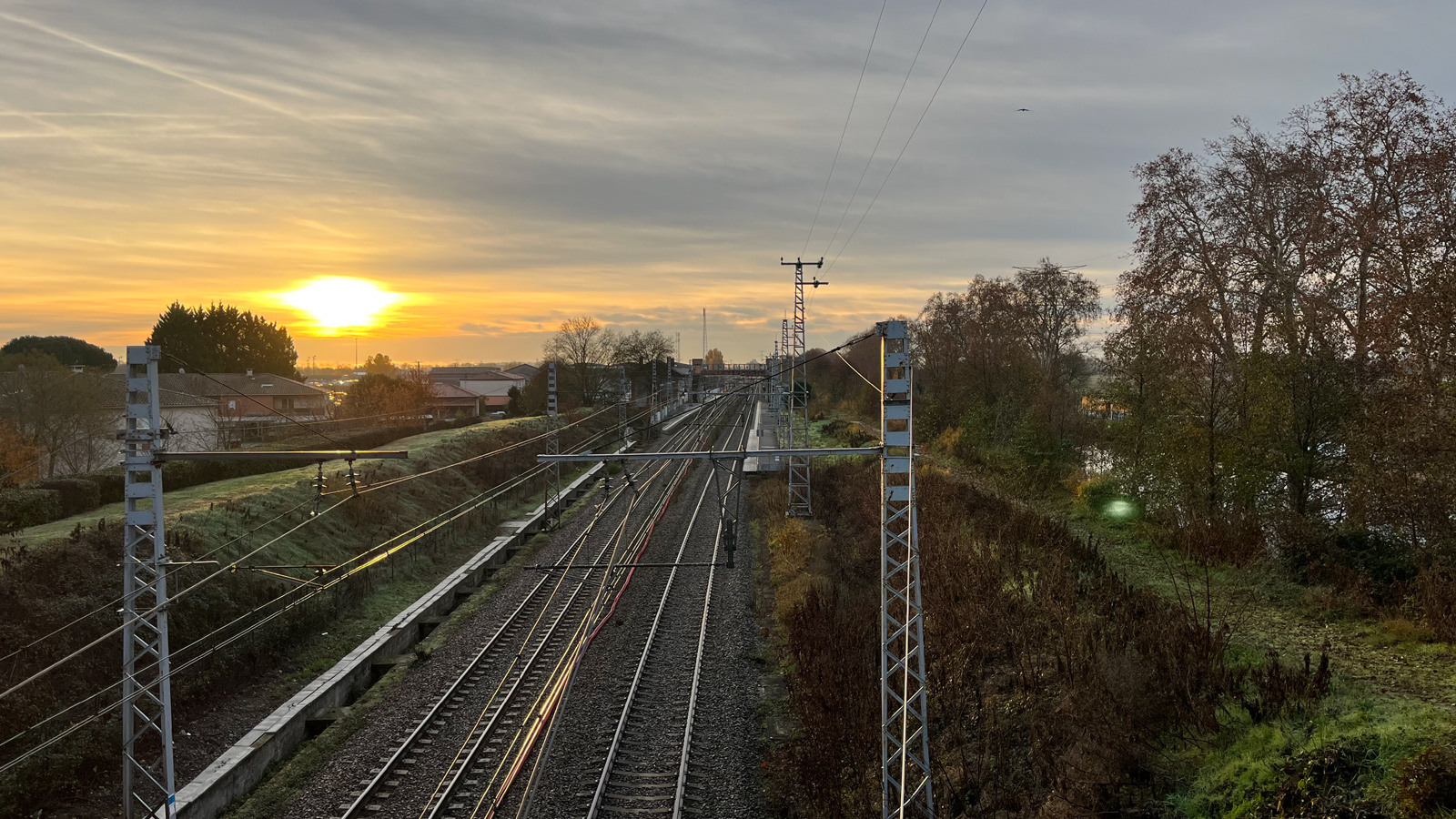Following the favourable opinion issued by the commission of enquiry at the beginning of the month, on 18 October the Prefect of Gironde issued the environmental authorisation for the AFSB. SNCF Réseau has therefore begun the work that required this authorisation.
In addition, on Friday 6 December, the Bordeaux Administrative Court rejected the application for suspension lodged against the extension of the DUP for the AFSB.
Alain Rousset, President of the Nouvelle-Aquitaine Region and President of the Société du Grand Projet du Sud-Ouest (SGPSO), Christine Bost, President of Bordeaux Métropole, and all the presidents of the 22 other local authorities that are members of the SGPSO, which is financing the project, are delighted that the AFSBs are coming to fruition, to the benefit of low-carbon daily transport.
The project, on the Bordeaux-Agen route, responds to the challenges of its area and its time:
- It will increase the capacity of the existing line in order to develop services (i) within the scope of the RER Métropolitain with a minimum frequency of half an hour on the St-Mariens-Bordeaux-Langon route, (ii) on the Toulouse-Bordeaux-Dax high-speed line and (iii) for freight.
- The creation of a 3rd running track and a 4th track at stations will make it easier for trains to pass or overtake each other, thereby improving reliability and regularity.
- Access to stations will be facilitated by the development of interchanges, connecting trains with buses, cars and active modes of transport such as cycling and walking.
- Safety and comfort in the vicinity of tracks and level crossings will be improved, with acoustic protection screens and pedestrian and cyclist crossings.
The AFSBs make it possible to put into practice what is important for users: in an area that is gaining 10,000 inhabitants a year, they offer a low-carbon mode of mobility on a daily basis that helps make the planet more liveable, improves air quality, and reduces urban pollution and traffic congestion.
‘This project marks the start of the creation of new links between the south of Bordeaux and the metropolis, as well as between Toulouse, Dax, Bordeaux and the south-west, and between northern and southern Europe. It's a great moment, and it promises to improve the daily mobility of tens of thousands of users. Let's rejoice at this magnificent step forward,’ said Alain Rousset, President of the Nouvelle-Aquitaine Region and Chairman of the SGPSO.
Christine Bost, President of Bordeaux Métropole, said: ‘The partners are committed to improving rail traffic between the metropolis and the south of Gironde. The rail developments to the south of Bordeaux form the basis of the Metropolitan Regional Express Service, which will enable thousands of workers, students and users to benefit from regular, low-carbon mobility. Bordeaux Metropole is fully committed to daily trains and long-distance fast trains, which complement each other’.
The New South-Western Line: construction progressing well
Alain Rousset, President of the Nouvelle-Aquitaine Region and Chairman of the Société du Grand Projet du Sud-Ouest (SGPSO) public body, Carole Delga, President of the Occitanie / Pyrénées-Méditerranée Region and Pierre-André Durand, Prefect of the Occitanie Region and coordinator of the Grand Projet du Sud-Ouest, brought together the project's stakeholders on 4 December in Toulouse within the governance bodies of the Ligne Nouvelle du Sud-Ouest.
Alain Rousset chaired the Supervisory Board of the SGPSO, a public body made up of 24 local authorities from the south-west of France. The local authorities notably approved the 2025 budget guidelines and the second financing agreement for the New Line, financed entirely by the SGPSO to the tune of 267.4 million euros.
The elected representatives were pleased to note that work on the AFNTs and AFSBs was underway, as well as geotechnical investigations on the route of the New Line and an initial archaeological diagnostic operation to complete the ecological inventories begun in 2023, led by SNCF Réseau. The worksite is thus a concrete reality on all the components of the New South-Western Line (LNSO).
‘Cooperation between the regions of Nouvelle-Aquitaine and Occitanie means that we can take account of the needs of users and local players, who have been waiting too long for the arrival of the LGV and a real improvement in everyday mobility. In the face of the climate emergency, it is imperative to rapidly develop rail transport for both passengers and freight. The local authorities and the State see the new line as a genuine project for ecological transition and low-carbon mobility for the whole of the South-West. This line is now a work in progress and is the concrete expression of our commitment to reducing our carbon footprint,’ declared Carole Delga, President of the Occitanie Region.
‘Only the New South-Western Line (LNSO) can meet the challenge of decarbonising everyday mobility, by enabling more TER trains to run and encouraging a modal shift in long-distance journeys, particularly from road and air, it will make an active contribution to the ecological transition. Attempting to run faster trains on the current infrastructure would automatically lead to a reduction in the number of TER trains available. But we need more trains for our daily journeys, more trains for long-distance journeys and more freight trains. The only solution to meet these growing needs is to double our rail infrastructure. This is precisely the ambition we are pursuing with this structural project,’ said Alain Rousset, President of the Nouvelle-Aquitaine Region and Chairman of the SGPSO.
Click here to see the press release
